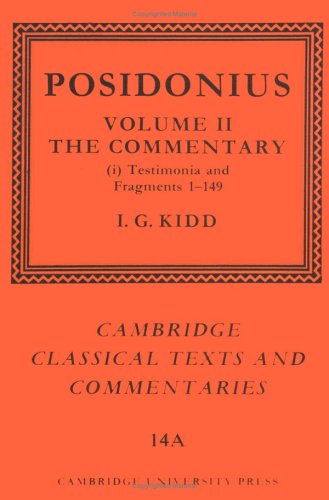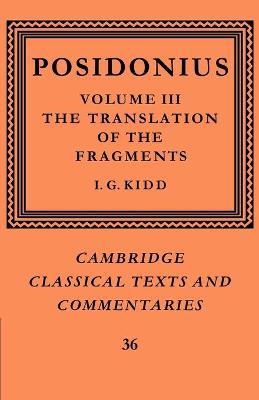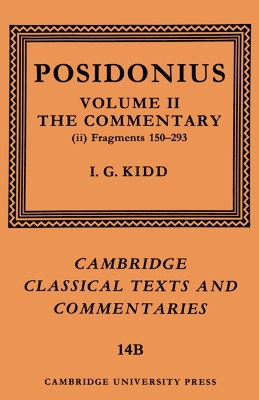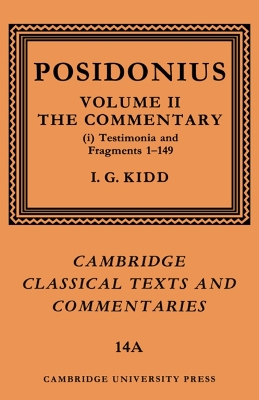Cambridge Classical Texts and Commentaries
5 total works
This book is a commentary on the surviving testimonia and fragments of Posidonius' work collected in Volume I of this edition (Edelstein/Kidd, CUP, 1972). Posidonius was one of the most important philosophers and intellectuals writing in the first century BC Graeco-Roman world. The purpose of this commentary is to assess the fragmentary evidence and reports of Posidonius found in the writings of about sixty ancient authors, and to separate what Posidonius himself actually said from the interpretations and distortions of his reporters. Since Posidonius also wrote at length on the sciences and on geography, and composed a large History, Kidd assesses his work against the philosophical, scientific, and historical writings of Posidonius' predecessors and contemporaries. Each fragment is explored through detailed examination of its context, philosophical and scientific content, and its relationship to Posidonius' whole thought and to contemporary ideas. This commentary proved too long for one volume and thus is issued in two separate books, which are available only as a set.
This book is a commentary on the surviving testimonia and fragments of Posidonius' work collected in Volume I of this edition (Edelstein/Kidd, CUP, 1972). Posidonius was one of the most important philosophers and intellectuals writing in the first century BC Graeco-Roman world. The purpose of this commentary is to assess the fragmentary evidence and reports of Posidonius found in the writings of about sixty ancient authors, and to separate what Posidonius himself actually said from the interpretations and distortions of his reporters. Since Posidonius also wrote at length on the sciences and on geography, and composed a large History, Kidd assesses his work against the philosophical, scientific, and historical writings of Posidonius' predecessors and contemporaries. Each fragment is explored through detailed examination of its context, philosophical and scientific content, and its relationship to Posidonius' whole thought and to contemporary ideas. This commentary proved too long for one volume and thus is issued in two separate books, which are available only as a set.
Posidonius was a major intellectual figure of the Hellenistic world whose interests and contribution spread over the whole intellectual field: philosophy, history, the sciences. His writings are of interest not only to philosophers and classicists, but also to historians and history of science. His work survives only in fragments. The text of these fragments, collected and edited by L. Edelstein and I. G. Kidd, was published in 1972 (Vol. I The Fragments), with a second edition in 1989. This collection, along with Vol. II The Commentary by I.G. Kidd (1988), has become established as the definitive modern edition. However, many of the fragments are extremely difficult to translate, and this volume of translations has been compiled to make this interesting material more easily accessible to scholars and students. The translations are accompanied by contextual introductions and explanatory notes where necessary. An Introduction summarises the importance of Posidonius and his work.
Posidonius: Fragments: Volume 2, Commentary, Part 2
by Posidonius and I.G. Kidd
Published 20 May 2004
Posidonius was one of the most important philosophers and intellectuals writing in the Greco-Roman world of the first half of the first century B.C. This book is a commentary on the surviving testimonia and fragments of his work collected in volume 1. Its purpose is to explicate and understand the evidence of these fragments, which must form the basis for any estimate of Posidonius' contribution to the learning of his time in the history of ideas. Since Posidonius was reported by at least sixty different writers, an attempt has been made to disentangle what Posidonius said, as distinct from the interpretations and distortions of his reporters. Posidonius wrote at length not only on philosophy, but also on the sciences, and a large History, and Professor Kidd has assessed Posidonius' work against the background of the philosophical, scientific and historical writings of his predecessors, contemporaries amd followers; for this many other related passages are cited and examined.
Posidonius was one of the most important philosophers and intellectuals writing in the Greco-Roman world of the first half of the first century B.C. This book is a commentary on the surviving testimonia and fragments of his work collected in volume 1. Its purpose is to explicate and understand the evidence of these fragments, which must form the basis for any estimate of Posidonius' contribution to the learning of his time in the history of ideas. Since Posidonius was reported by at least sixty different writers, an attempt has been made to disentangle what Posidonius said, as distinct from the interpretations and distortions of his reporters. Posidonius wrote at length not only on philosophy, but also on the sciences, and a large History, and Professor Kidd has assessed Posidonius' work against the background of the philosophical, scientific and historical writings of his predecessors, contemporaries amd followers; for this many other related passages are cited and examined.




